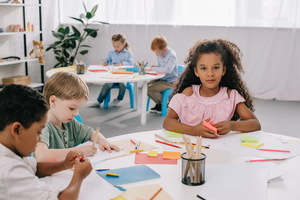Best 21 Blog Post Ideas for Kids Creating their First Blog
Blogging can be a child’s play if we look at it from a different perspective. There are many children that have started successful blogs around the world. Blogging is also a wonderful hobby that helps bring out the creativity of kids in a field they love.
In this article, we will discuss 21 blog post ideas for kids and adults interested in creating and learning to start a blog.
21 Top Ideas for Kids to Create a Blog
Regardless whether you’re a parent that wishes to encourage your kid to create a blog or the child, you might find these ideas interesting.
Your Experiences
Nothing attracts people than reading your experiences. As a child, you can start a wonderful blog by writing about your own experiences in growing up.
Stamps Collection
Maybe you’re unaware but collecting postage stamps is one of the greatest hobbies worldwide. Start a blog that showcases your collection of postage stamps and speaks about how you got them.
Coins Collection
Numismatics might sound a bit foreign to you. All it means is collecting coins from your own country and abroad. Collecting coins is also a superb way to gain general knowledge. Start a blog about coins collection.
Helping Mom Around
Do you help your Mom around the house? Then surely you can help other kids to learn from your experiences. Write these as a personal experience by creating a wonderful blog.
Dad’s World
All kids have some thoughts about their Dad. Why not write about these. It could prove to be an amazing blog for kids around the world. After all, Dad deserves some appreciation too.
School Experiences
Not all experiences we have at school are happy. Nor are they sad. But that’s exactly how you could help other kids to know the ups and downs of school life while helping them to cope up.
Toys
Getting away from toys can prove hard as we grow up. Buzz Lightyear and those Toy Stores, superheroes, all continue to be an integral part of my life till today. Create a blog that speaks about your favorite toys.
Bullying
Now this is something serious. And I wish and pray you never have been bullied by other kids. Give a voice to injustice you’re facing by writing about bullying. Take some assistance from law enforcement officials in your place to know more about this disease that affects countless kids worldwide.
Volunteering
Encourage other kids of your age to do good for someone else. It could be an elderly in your place or someone you care about. Seniors always love kids. And your blog could possibly help bring a cheer on their faces.
Your Brother or Sister
This might sound funny to you. But if you’re fortunate to have a brother or sister, write interesting articles about them. We love and sometimes hate our brothers and sisters but mean no harm. Write funny things about your brother or sister that would help kids of your age. But remember, never to hurt them.
Pets
Having pets is one of the best parts of childhood. Innocent as we are, dogs and cats never stop fascinating us. Write about your pets and how you handle them.
Cooking
Cooking brings to my mind a Scottish teenager called Fraser Doherty. He began making jams from his grandma’s recipes and eventually became famous as the ‘Jam Boy’ in the UK. If you’ve some ideas about food we all enjoy, write about this.
DIYs
As a child I would love doing stuff myself. Juts for the thrill of seeing something I create works or doesn’t. I’m no engineer but just these simple things like building a small radio or repairing a blender would thrill me.
Toothaches
All of us kids undergo toothache at some time. And if you’ve ever been through one, you’ll know it knocks our senses out. Going to a dentist is scary. Write about own experiences when you have one. Not when you’re down but your personal experiences with a dentist and toothaches.
Birds
We often watch birds around. Some of these birds are seen rarely because they migrate. Should you be the one loving birds, write about the. Also, include some pictures if you can take them.
School Lessons
Good at any subject in your school. Help other students to learn more about subjects they lag. Teach them with you experiences and simple words on how to help learn something the way you cope with.
Music
Music is a universal language everyone can relate to. What is your favorite type of music? Who are your favorite singers and bands? A music blog is a great way to connect with other fans that like the same music as you do.
Shopping
Kids are often curious about what their parents buy at stores. Write about your funny experiences in trying out new and interesting products that your parents buy and you try out.
Video Games
I’ve rarely come across a kid that doesn’t love video games. Create superb posts about video games you’re playing. You might find a lot of kids who share your hobby and would love learning more from you.
Picnics
Personal experiences about picnics are almost popular around the world. Other kids also want to have similar experiences and would identity with you. Create a blog with your own experiences or that of your friends.
Make Money as Kid
American labor laws are strict about kids working. Yet, there are some online jobs you could take as a child where possible. Help other children learn this important skill of making money during holidays.
In Conclusion
Before concluding I’ll add that being a kid isn’t any reason why you can’t start your own blog. Try it out and you could definitely create something that helps the world. Personally, I have amazing hobbies that I write about often. Blogging as a kid helps you earn some income. If you’re successful, it’s possible to create a brand image for yourself too. And this can be an asset all your life.
A little extra effort as a kid can help shape your future too. There are great online resources that can help you set up a website, even for a kid. The younger you start, the higher your chances of success. Never let age define whom you wish to be and what you could become. Remember, successful adults often start small as kids.







